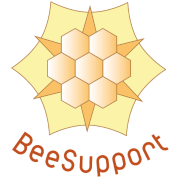Tropical Beekeeping ENG
Of the approximately 20,000 species of bees on Earth, it is estimated that no more than 5% live in colonies. Colony-forming and solitary or wild bees occur in town and country, except on eternal ice. The colony-forming species are highly social and form 3 sex groups: the Apis species (honeybees), the Bombus species (bumblebees) and the Melipona species (stingless bees).
Bees fly around the nest in a habitat with a range of ±10 meters to ±5 kilometers. A colony of honeybees multiply by reproductive swarming. In warmer regions, a colony of honey bees also moves from one nesting site to another. When migrating (looking for a better place) or absconding (leaving a bad place), a colony can travel tens of kilometers. Especially climate and season, the local ecosystem, disturbances and the gestation (pollen and nectar in crops) determine the way of life.
Reference related to tropical & global beekeeping.
Not complete or exhaustive, but hopefully inspiring for more self-study.
Standing commission for pollination and bee flora, Apimondia Mission Document
Universidad National, CINAT - UNA, Costa Rica
WUR, Wageningen University & Research, bijen, The Netherlands
Practical guide for farmers: Agroforestry systems in the Upper Mara River Basin
TECA: Technologies and Practices for Small Agricultural Producers
Volunteers in Technical Assistance, VITA publications, INT
Harlan HD Attfield, 2001, A Beekeeping Guide for the tropics and subtropics
Making life better with bees, Bees for Development, UK
Resource Centre, the specialist international beekeeping organisation
Nature Based Beekeeping in Uganda in collaboration with TUNADO
Relieving poverty through beekeeping, Bees Abroad, UK
High quality organic-certified bee products (wax), Bees for the World, DE
Universitat Hohenheim, Landesanstalt fur Bienenkunde, DE
Sustainable Food and Agriculture, Acces Agriculture, INT
Beekeeping, Turning honey into money
FiBL, Forschungsinstitut für Biologischen Landbau, SCHWEIZ
Training materials: Organic Africa
Manual for trainers: African Organic Agriculture Training Manual
Apimondia, INT - Apiservices, FR - Vita Bee Health, EU
IFAD, Investing in Rural People, practical tools, EU
Feed the Future, USAID, a Global Hunger and Food Security Initiative, US
Lessons learned: Beekeeping in the Philippines
PUM, Programma Uitzending Managers, INT
Perspectives for honey production in the tropics, Marinus J. Sommeijer (i.m.) e.a.
